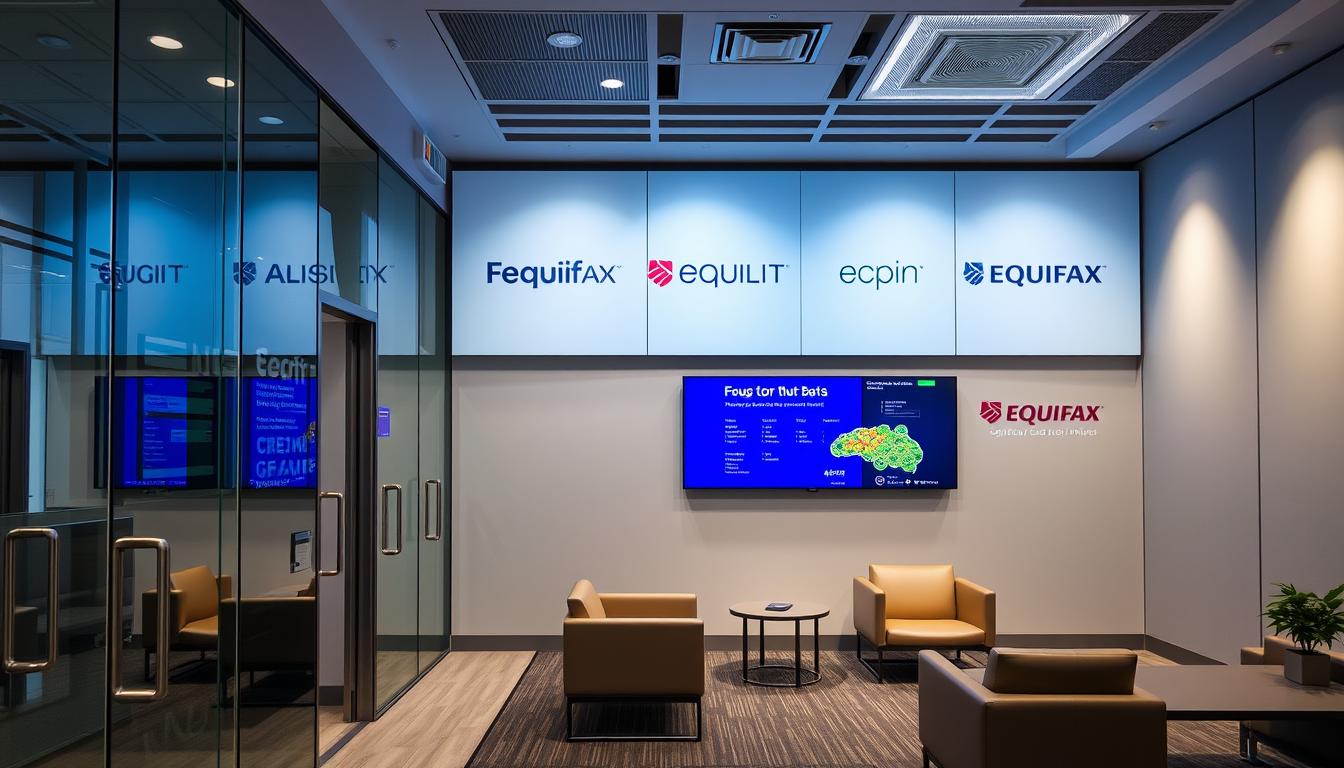Equifax is a major player in the U.S. banking industry. It’s one of three main credit reporting agencies. Banks and lenders use Equifax data to assess creditworthiness and make loan decisions.
Equifax reports influence various financial products. These include mortgages, auto loans, credit cards, and personal lines of credit. The agency’s data is crucial for lenders evaluating loan applications.
This article explores Equifax’s role in banking. We’ll look at which banks use Equifax services. We’ll also examine how Equifax scores affect lending decisions.
Key Takeaways
- Equifax is one of the three major credit reporting agencies in the United States, with a significant influence on the banking industry.
- Many major banks and financial institutions rely on Equifax credit reports and scores to evaluate creditworthiness and make lending decisions.
- Equifax credit scores play a crucial role in the approval and terms of mortgages, auto loans, and credit card applications.
- Equifax has a widespread network of lender partners, including banks, credit card companies, and other financial institutions.
- Monitoring your Equifax credit report is essential for maintaining a healthy credit profile and ensuring accurate information is reported.
Understanding the Role of Equifax in the Banking Industry
Equifax is a key player in the U.S. banking industry. It collects credit data on millions of consumers. This information helps lenders assess risk and make smart lending choices.
What is Equifax?
Equifax is a global leader in data, analytics, and technology. It aids businesses and consumers in making informed decisions. Many equifax bank partners use its credit reports to evaluate loan applications.
Equifax’s Partnership with Banks
Equifax works with many banks and financial institutions. These partners rely on Equifax’s credit reports for lending decisions. They use equifax credit reports to assess customer creditworthiness and reduce default risk.
“Equifax’s data and analytics are essential for banks and lenders to make responsible lending decisions and build long-term relationships with their customers.”
Banks use Equifax’s data to understand customer creditworthiness better. This allows them to offer tailored financial products and services. These offerings meet each customer’s unique needs.

Major Banks That Rely on Equifax Credit Reports
Many large U.S. banks use Equifax credit reports to assess customer creditworthiness. Equifax provides crucial data and scoring models for informed lending decisions. These reports help banks evaluate potential borrowers effectively.
Major banks using Equifax’s credit data include:
- Bank of America
- Chase
- Wells Fargo
- Citibank
- U.S. Bank
- PNC Bank
- Capital One
These financial institutions depend on Equifax’s extensive credit information and scoring algorithms. The data helps them evaluate customer creditworthiness and make sound lending choices. Equifax’s analytics are vital in these banks’ decision-making processes.
| Bank | Use of Equifax Credit Reports |
|---|---|
| Bank of America | Utilizes Equifax credit data and scoring models to assess customer creditworthiness for lending and credit decisions. |
| Chase | Relies on Equifax’s extensive credit information to evaluate the creditworthiness of potential borrowers. |
| Wells Fargo | Incorporates Equifax credit reports and scores as a key factor in its lending and credit approval processes. |
| Citibank | Uses Equifax’s credit data and analytics to make informed decisions about extending credit to customers. |
| U.S. Bank | Leverages Equifax’s credit reporting services to assess the creditworthiness of its retail and commercial clients. |
Banks value Equifax’s credit data for accurate lending decisions. This information helps them understand customer financial profiles better. It also enhances their credit risk management strategies overall.

Equifax Credit Scores: A Key Factor in Lending Decisions
Equifax credit scores are vital for securing loans. These scores range from 300 to 850. They help lenders assess your creditworthiness and make informed decisions.
Banks often set minimum score requirements for loan approvals. Your Equifax score can greatly impact your chances of getting a loan.
What Is a Good Equifax Credit Score?
Most lenders consider Equifax scores of 620 or higher as “good”. This indicates a lower credit risk. However, required scores can vary by loan type and lender.
Some lenders may need a 700 score for mortgages. Others might approve auto loans with scores as low as 580.
How Equifax Credit Scores Influence Loan Approvals
Higher Equifax credit scores increase loan approval chances. They may also lead to better interest rates and terms.
Lower scores can make financing harder to secure. They may result in less favorable loan conditions.
Understanding how Equifax credit scores affect approvals is crucial. It helps improve your financial standing and access needed credit.

“Maintaining a good Equifax credit score is essential for securing the best possible loan terms and getting your financial goals on track.”
Which Banks Use Equifax
Equifax is a key player in the banking industry. As a major credit reporting agency, it provides vital data to countless financial institutions. These include national banks, regional banks, credit unions, and various lenders.
Many lenders depend on Equifax’s credit reports and scoring models. They use this information to make lending decisions and manage risks. Major banks using Equifax services are crucial in providing diverse financial products to consumers.
Equifax’s list of Equifax partner banks is extensive. It includes traditional banks and fintech companies. These institutions value Equifax’s data-driven insights for improving their lending processes. Financial institutions working with Equifax benefit from optimized risk management strategies.
| Major Banks Using Equifax | Equifax Partner Banks |
|---|---|
| JPMorgan Chase | Bank of America |
| Wells Fargo | Citibank |
| Bank of America | U.S. Bank |
| Citibank | PNC Bank |
| U.S. Bank | Capital One |
Equifax’s partnerships with which banks use Equifax are wide-ranging. This highlights the agency’s important role in the financial sector. Equifax helps lenders make smart choices and provide necessary credit to consumers.

Equifax’s Lender Partners: Banks and Financial Institutions
Equifax has built a vast network of partnerships with banks, credit unions, and other financial institutions. These equifax lenders and equifax bank partners use Equifax’s credit reporting and scoring services. They rely on this data to make informed lending decisions.
The full list of financial institutions working with equifax isn’t public. However, Equifax’s website and industry reports show it works with various lenders. These include major national banks, regional banks, community banks, credit unions, and specialty finance companies.
Exploring Equifax’s Widespread Lender Network
Equifax plays a key role in credit decision-making across the banking industry. It provides equifax lenders with reliable, up-to-date credit information. This helps lenders assess borrowers’ creditworthiness more effectively.
| Lender Type | Examples of Equifax Partners |
|---|---|
| National Banks | JPMorgan Chase, Bank of America, Wells Fargo |
| Regional Banks | PNC Bank, U.S. Bank, Regions Bank |
| Community Banks | First National Bank, Peoples Bank, Hometown Bank |
| Credit Unions | Navy Federal Credit Union, Alliant Credit Union, State Employees’ Credit Union |
| Specialty Finance Companies | Avant, Upstart, SoFi |
This table shows the diverse range of equifax lenders and equifax bank partners. It highlights Equifax’s broad influence in the financial industry. These partners rely on Equifax’s services for their lending decisions.
The Impact of Equifax on Mortgage and Auto Loan Applications
Equifax, a major credit reporting agency, is vital in mortgage and auto loan applications. Lenders use Equifax’s credit reports to assess borrowers’ creditworthiness. Higher Equifax scores increase approval chances and may offer better financing options.
A borrower’s Equifax credit score is crucial for loan eligibility and terms. Good or excellent scores typically make loan approval easier. These scores also help secure better loan terms.
Lower Equifax scores can lead to loan application challenges. Lenders may see these borrowers as risky. This can result in loan denials or less favorable terms like higher interest rates.
“Equifax’s credit reports and scoring models are essential tools for lenders in assessing the creditworthiness of mortgage and auto loan applicants. A strong Equifax credit score can make a significant difference in the loan approval process and the terms offered to borrowers.
Knowing your Equifax credit report is key for mortgage or auto loan seekers. Understanding Equifax’s role can help improve your creditworthiness. This increases your chances of getting favorable loan terms.
Credit Card Companies and Equifax: A Symbiotic Relationship
Credit card companies and Equifax have a mutually beneficial relationship. Equifax provides crucial credit data and scoring models. These tools help card issuers make important decisions about approvals and terms.
Higher Equifax scores often lead to better credit card offers. This includes higher limits and lower interest rates. Lower scores may result in denials or less favorable terms.
Equifax’s influence in consumer lending is significant. Their data shapes how credit card companies evaluate potential customers.
How Equifax Affects Credit Card Approvals and Limits
Equifax’s credit reports are key in credit card approvals. Card issuers use this data to assess applicants’ creditworthiness. They also use it to set credit limits and interest rates.
High Equifax scores often lead to better card offers. These may include higher limits and lower rates. Low scores can result in denials or less favorable terms.
Maintaining a good Equifax score is crucial. It can greatly affect your ability to get and keep credit cards.
“The strong relationship between credit card companies and Equifax highlights the significant influence that Equifax’s credit data and scoring models have on the consumer lending industry.”
Staying Informed: Monitoring Your Equifax Credit Report
Equifax credit reports are key in shaping your financial future. They help decide what money options you can get. Checking these reports often is vital for your credit health.
You can get your free Equifax credit report once a year. This helps you spot any mistakes that could hurt your equifax credit scores. Keeping an eye on your credit data ensures banks use correct info about you.
- Obtain your Equifax credit report annually
- Thoroughly review the report for any inaccuracies or errors
- Dispute any issues with Equifax to ensure your credit information is correct
- Stay informed about changes to your equifax credit reports and scores
“Regularly monitoring your Equifax credit report is crucial for maintaining a healthy financial standing and maximizing your lending opportunities.”
Being proactive about your Equifax credit info boosts your financial confidence. It helps ensure your creditworthiness is shown accurately. This can lead to better loan terms and improved money choices.
Conclusion
Equifax plays a crucial role in banking and lending. Major banks rely on Equifax credit reports for important lending decisions. This affects mortgages, auto loans, and credit card applications.
Consumers should understand how Equifax impacts their financial opportunities. It’s important to monitor your credit reports regularly. This ensures they accurately reflect your creditworthiness.
Being informed about your Equifax profile empowers you to make smart choices. You can access the financial products and services you deserve. Stay vigilant about your credit profile.
The partnership between Equifax and banks will remain important. By staying informed, you can navigate the financial landscape confidently. This approach helps maximize your chances for success.

